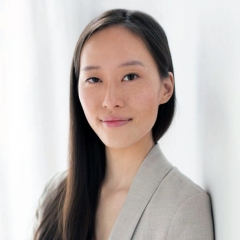Software Engineering (BEng)
Virtual information sessions
Want to know how we're training the next generation of engineers and computer scientists? Join us to learn about the Gina Cody School's undergraduate programs and plans to advance integrated technologies in a socially responsible manner.
Why study Software Engineering?
Design, code, and test software products – with the big picture in mind. You'll learn a range of skills that will allow you build Apps that capture a new market to large scale system like financial software and information databases. As a software engineer, your expertise in software architectures and refactoring, continuous integration and DevOps, and microprocessors will give you the tools to tackle these challenges everyday.
Concordia was one of the first universities in Canada to introduce an undergraduate program in Software Engineering. Our state-of-the-art labs for software analytics, big data, networks, 3D graphics, high-performance computing and artificial intelligence will give you experience with the tools you’ll use in the field. Through labs, lectures and projects, you’ll also:
- Study the life cycle of software products from specification through analysis and design, to testing maintenance and evaluation
- Study the range of paradigms practised by software developers
- Create professional-quality software systems with professional techniques and tools
- Learn to balance large-scale product development, with safety, reliability, cost and scheduling
All of our Engineering programs are accredited by the Canadian Engineering Accreditation Board and you’ll graduate eligible to become a registered professional engineer.
Program highlights
- The student-run Software Engineering and Computer Science Student Society (SCS) organizes coding nights, algorithm practice, tutorials, social events, and networking opportunities.
Special funding for out-of-province students
Up to $4000 for undergraduate programs.
Program structure
The Bachelor of Engineering in Software Engineering takes a minimum of four to five years (120 – 150 credits) of full-time study, depending on your academic background.
Courses
The curriculum consists of the Engineering core, the Software Engineering Core and electives from one of three elective groups: Real-time, Embedded and Avionics.
Course sequences
Co-op program
The Co-op program gives you the chance to complete three paid work terms that last 12 to 16 weeks. As a Co-op student, you will be involved in the development and testing of real-world software and will work alongside experienced developers and engineers. You may also:
- Develop, program, design, and test new or existing software products
- Develop real-time control and data acquisition systems
Admission criteria
Minimum cut-off averages and course requirements
- Quebec CEGEP: 27 overall, 26 math, 25 physics
- Admission is based on applicants’ overall, math and physics CRC indicated above and completion of the following classes as part of their DEC: General Chemistry 1; Calculus 1 and Calculus 2 and Linear Algebra; Mechanics and Electricity and Magnetism.
- Students completing one of the eligible technical DECs may qualify for admission without the listed prerequisites. However, if the prerequisites are taken, a minimum of 26 in math and a 25 in physics are required.
- Eligible technical DECs include 420.A0/BO/AA
- Advanced standing may be possible
- Additional information for CEGEP applicants
- High school: A- overall, A- in math, B+ in physics
- One math from Pre-Calculus, Calculus, or equivalent
- Grade 12 or university-preparatory physics
- Canadian curricula course requirements
- Accepted international qualifications
- ACT or SAT is not required
- AP exams are not required but may qualify you for advanced standing
- Indigenous Bridging Program: First Nations, Inuit and Métis students who do not meet Concordia’s conventional admission requirements may be eligible for admission through the Kaié:ri Nikawerá:ke Indigenous Bridging Program
- International Baccalaureate (IB) diploma: 33 overall, 5 HL or 6 SL math, 5 HL or SL physics
- one math (Applications and Interpretations HL, Analysis and Approaches HL or Analysis and Approaches SL)
- one of the math or physics courses must be completed at the HL level
- International Baccalaureate Career-related Programme (CP): 33 overall, 5 HL or 6 SL math, 5 HL or SL physics
- Same as International Baccalaureate Diploma Programme (DP) requirements
- Additional Career-related Programme (CP) course requirements
- Baccalauréat français: 15 overall, 15 in math, 14 in science
- Required courses:
- Première: Spécialité mathématiques and Spécialité physique-chimie
- Terminale: Spécialité mathématiques (also accepted, Spécialité Physique-Chimie and Mathématiques Complémentaires)
- Additional information for Baccalauréat français applicants
- Required courses:
- British system of education (GCE):
- A-levels: At least two A-level exams AB, B in math, B in physics or
- AS-levels: At least 4 AS-level exams with equivalent results or
- BTEC: Level 3 Diploma or Extended Diploma in a related subject area with equivalent results
- Students without math or physics A-levels may be admissible based on AS-level or iGCSE/GCSE/O-Level exam results. Students should include all their exam results from iGCSE (or equivalent) onwards to support their application.
- Additional information for British System of Education (GCE) applicants
- University transfer (internal): 3.0 overall, 3.0 in math/physics, 2.3 in courses offered by the Gina Cody School of Engineering and Computer Science
- PHYS 204 or 205 (or equivalent)
- At least two of the following (or equivalent): MATH 203, 204, 205
- University transfer (external): A- overall, B+ in math, B+ in physics
- Courses in the disciplines of Calculus, Chemistry and Physics
Minimum cut-off averages should be used as indicators. The cut-off data may change depending on the applicant pool. Applicants who meet the stated minimum requirements are not guaranteed admission to these programs.
Application deadlines
It’s not too late to apply
Most undergraduate programs are still accepting applications for fall 2025.

FALL ENTRY (September)
Deadline: March 1
International applicants: Apply no later than February 1 to allow time for immigration document processing. However, applying earlier is strongly recommended. Immigration processing times vary by country, and delays could prevent you from starting your studies on time.

WINTER ENTRY (January)
Deadline: November 1
International applicants: Apply no later than August 1 to allow time for immigration document processing. However, applying earlier is strongly recommended. Immigration processing times vary by country, and delays could prevent you from starting your studies on time.
We reserve the right to close admission to a program at any time after the official deadline without prior notice.
Funding note
Quebec residents who enroll in certain programs and meet the eligibility criteria may apply for funding of $2,500 per term through the Quebec Perspective Bursary (Bourse Perspective Quebec).
United States students: A U.S. Federal Student Aid-eligible version of this program is offered. This version meets all U.S. regulations (such as no co-operative education or e-courses) for eligible programs.
After your degree
Software Engineering alumni have established careers in a range of sectors, including telecommunications, finance, health care, manufacturing, aeronautics and the entertainment industry, notably video game and animation. Some have been hired by:
- Bombardier
- CAE Inc.
- Ericsson
- Merck Canada
- Microsoft
- Ubisoft
Student story

Doris Oh
Bachelor of Engineering Option: Civil Infrastructure (Co-op)
There are plenty of opportunities to follow your curiosity in the Gina Cody School of Engineering and Computer Science, where Doris Oh dives into her first internship through Co-op.
Other programs of interest

The Computer Applications option gives doubly passionate students the flexibility to combine a traditional computer science degree and with a non-traditional field. Though many students complete a Major in Computation Arts or a Major in Mathematics and Statistics, students may declare a major or minor in any area outside the Faculty of Engineering and Computer Science.
Department
Department of Computer Science and Software Engineering
Faculty


